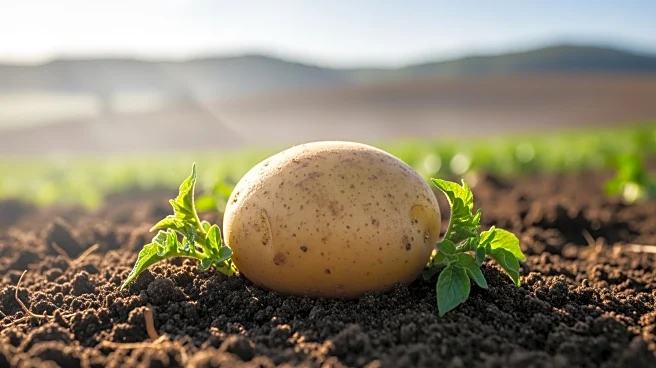What's Happening?
The global potato industry is increasingly adopting climate-smart farming practices to address sustainability challenges. Unlike corn and soybean producers, potato growers face unique agronomic and economic risks, which have led to a slower pace of change.
Potatoes are grown in diverse agro-ecological zones and are sensitive to soil, water, and disease pressures. The industry is now focusing on reducing emissions, building resilience, and maintaining productivity through coordinated supply-chain programs and regional initiatives. In North America, the Potato Sustainability Alliance is leading efforts with on-farm assessment programs, while major processors like McCain Foods are implementing regenerative agriculture frameworks. In Europe, stringent environmental regulations are driving change, and in Asia, climate-smart practices are linked to food security strategies. Africa and Latin America focus on resilience, with climate-smart practices aimed at improving seed health, water use, and soil management.
Why It's Important?
The adoption of climate-smart practices in the potato industry is crucial for meeting global sustainability targets and ensuring food security. Potatoes are a staple crop in many regions, and their production impacts both local economies and global food systems. By implementing these practices, the industry can reduce its environmental footprint, improve resilience to climate change, and maintain productivity. This transition is significant for processors and retailers who are increasingly committed to regenerative agriculture and net-zero value chains. The move towards climate-smart farming also aligns with broader policy goals, such as the EU's Farm to Fork strategy, which aims to reduce pesticide use and expand organic farming. As the industry adapts, it will contribute to global efforts to combat climate change and support sustainable agriculture.
What's Next?
The potato industry is expected to continue its transition towards climate-smart farming, with several trends shaping its future. Supply-chain targets and verification frameworks will become standard, ensuring that sustainability commitments are met. The development of decarbonized inputs, such as low-carbon fertilizers and energy-efficient storage technologies, will further reduce emissions. Digital agronomy tools will help growers make informed decisions, reducing the perceived risk of change. Breeding programs will focus on developing heat- and drought-tolerant varieties, crucial for regions facing climate shocks. Policy alignment will play a key role in supporting these transitions, with government incentives and regulations influencing the pace of adoption. As the industry evolves, it will need to balance environmental objectives with economic viability.
Beyond the Headlines
The shift towards climate-smart farming in the potato industry has deeper implications for global agriculture. It highlights the need for tailored solutions that address the specific challenges faced by different crops and regions. The industry's focus on resilience and sustainability reflects broader trends in agriculture, where climate change is driving innovation and collaboration. This transition also underscores the importance of integrating environmental, economic, and social factors in agricultural practices. As potato growers adopt these practices, they contribute to a more sustainable food system, which is essential for meeting the needs of a growing global population. The industry's efforts can serve as a model for other sectors, demonstrating the potential for coordinated action to address complex sustainability challenges.















